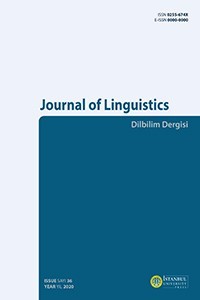Mis/disinformation on COVID-19 in Social Media Narratives in Nigeria and Iraq: An Exploratory Investigation of their Linguistic Features from Pragmatic Perspectives
Misinformation, Disinformation, COVID-19, Information manipulation theory
Mis/disinformation on COVID-19 in Social Media Narratives in Nigeria and Iraq: An Exploratory Investigation of their Linguistic Features from Pragmatic Perspectives
misinformation, disinformation covid-19, information manipulation theory Misinformation, Disinformation, COVID-19, Information manipulation theory,
___
- Africa Resilience Network, ARN (2021). Combating covid-19 misinformation in Nigeria: A compendium of selected stories from the ARN project. Abuja: Authorpedia Publishers. Retrieved from https://www.icirnigeria. org/icirup/2021/09/ENGLISH-COMBATING-COVID-19-MISINFORMATION-IN-NIGERIA.pdf google scholar
- Bedu, A. M. (2017). Semantico-pragmatic interrelation of editorials and their headlines in English-speaking Nigerian newspapers, Unpublished Ph.D. Thesis Süleyman Demirel Üniversity, Isparta. google scholar
- Bedu, A.M., & Thamer, A.A. (2022). A semantic evaluation of ideological positioning in awareness campaign against Covid-19 pandemic in Nigeria and Iraq from appraisal framework perspective. Journal of Language and Linguistic Studies, 18(1), 159-168. Doi: 10.52462/jlls.172. google scholar
- Bowers, J.W., Elliott, N.D., & Desmond, R.J. (1977). Exploiting pragmatic rules: Devious messages. Human Communication Research, 3, 235-2 google scholar Charteris-Black, J. (2021). Metaphors of coronavirus: Invisible enemy or zombie apocalypse? Cham: Palgrave Macmillan google scholar
- Chen, K., Luo, Y.; Hu, A., Zhao, J. & Zhang L. (2021). Characteristics of misinformation spreading on social media during the covid-19 outbreak in China: A descriptive analysis, Risk Management and Healthcare Policy 2021:14 1869-1879. google scholar
- Chilton, P. (2004). Analyzing political discourse: theory and practice. London: Routledge. google scholar
- Cinelli M, Quattrociocchi W, Galeazzi A, Valensise CM, Brugnoli E, Schmidt AL, Zola P, Zollo F, & Scala A.(2020). The covid-19 social media infodemic. Sci Rep.;10(1):16598. doi: 10.1038/s41598-020-73510-5. PMID: 33024152; PMCID: PMC7538912. google scholar
- Grice, H. P. 1975. “Logic and conversation”, in P. Cole and J. L. Morgan (eds.), Syntax and Semantics Vol. 3: Speech Acts, Academic Press, New York. 41-58 google scholar
- Grice, H. P. 1978. Some further notes on logic and conversation. In P. Cole (Ed.), Syntax and semantics, Vol. 9: Pragmatics (pp. 113-128). New York: Academic Press. google scholar
- Grice, H. P. 1989. Studies in the ways with words. Cambridge, MA: Harvard University Press. google scholar
- Guess, A. M. & Lyon, B. (2020). ‘Misinformation, disinformation, and online propaganda’ In google scholar
- Persily, N. & Tucker, J. A. (eds.) Social Media and Democracy: The State of the Field, Prospects for Reform.London: University of Cambridge P. 10-33 google scholar
- Ibrahim, B. and Sulaiman, A. (2020). Semiotic communication: An approach of understanding a meaning in communication, International Journal of Media and Communication Research Volume 1 (1): 22-32. google scholar
- Jack, C. (2017). Lexicon of lies: Terms for problematic information. Data & Society, 3, 22. google scholar
- Katermina, V. & Yachenko, E. (2020). Axiology of covid-19 as a linguistic phenomenon in English mass media discourse. Advances in Journalism and Communication, 2020, 8, 59-67. DOI: 10.4236/ajc.2020.82005 google scholar
- Linden D,, Lasorsa, D. L. &. Lewis, S. C. (2009) The news readability problem, Journalism Practice, 3:1, 1-12, DOI: 10.1080/17512780802560708 google scholar
- McCornack, S. (1992). Information manipulation theory Communication Monographs 59(1):1-16. doi: 10.1080/03637759209376245 google scholar
- Metts, S. (1989). An exploratory investigation of deception in close relationships, Journal of Social and Personal Relationships, 6, 159-180. google scholar
- Metts, S., & Chronis, H. (1986). An exploratory investigation of relational deception. Paper presented at the annual meeting of the International Communication Association, Chicago, IL. google scholar
- Sperber, D. (2000). Metarepresentations in an evolutionary perspective. In D. Sperber D. (2000). (ed.), Metarepresentations: A multidisciplinary perspective. (Oxford University Press), 117-137 google scholar
- Starbird, K., Arif, A., & Wilson, T. (2019). Disinformation as collaborative work: Surfacing the participatory nature of strategic information operations. Proceedings of the ACM on Human Computer Interaction, 3(CSCW), 1-26. google scholar
- Stewart, M. (2021). Defending weapons inspections from the effects of disinformation. American Journal of International Law, 115, 106-110. google scholar Wahl-Jorgensen, Andrew W., Richard, S., Janet H., Garcia-Blanco, I., Dencik, L., Stephen C., Carter, C., & Stuart A. (2016). the future ofjournalism. Journalism Practice 10 (7): 808-814. google scholar
- Wilson, T., & Starbird, K. (2020). Cross-platform disinformation campaigns: lessons learned and next steps. Harvard Kennedy School Misinformation Review, 1(1), 1-13. google scholar
- ISSN: 0255-674X
- Yayın Aralığı: Yılda 2 Sayı
- Başlangıç: 1976
- Yayıncı: İstanbul Üniversitesi
Türkçe Öğrenen Derlemi için Hata Etiketleme Sistemi
Irak Türklerinin Eğitimde Dil Tercihleri
Türkçede Betimlemeli İkincil Yüklemlerin Sözdizimsel ve Anlambilimsel Özellikleri
Semra BATURAY MERAL, Hasan Mesut MERAL
Türkçedeki Bazı Yardımcı Fiillerle Yapılan Bileşik Fiillerin TİD’de Kullanım Sıklığı
Ahmed Mohammed BEDU, Hind İSMAİL
